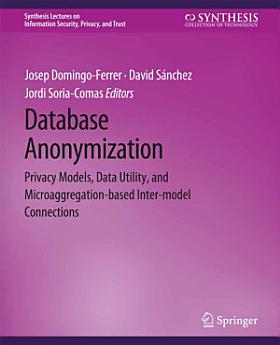Database Anonymization: Privacy Models, Data Utility, and Microaggregation-based Inter-model Connections
May 2022 · Springer Nature
Ebook
120
Pages
reportRatings and reviews aren’t verified Learn More
About this ebook
The current social and economic context increasingly demands open data to improve scientific research and decision making. However, when published data refer to individual respondents, disclosure risk limitation techniques must be implemented to anonymize the data and guarantee by design the fundamental right to privacy of the subjects the data refer to. Disclosure risk limitation has a long record in the statistical and computer science research communities, who have developed a variety of privacy-preserving solutions for data releases. This Synthesis Lecture provides a comprehensive overview of the fundamentals of privacy in data releases focusing on the computer science perspective. Specifically, we detail the privacy models, anonymization methods, and utility and risk metrics that have been proposed so far in the literature. Besides, as a more advanced topic, we identify and discuss in detail connections between several privacy models (i.e., how to accumulate the privacy guarantees they offer to achieve more robust protection and when such guarantees are equivalent or complementary); we also explore the links between anonymization methods and privacy models (how anonymization methods can be used to enforce privacy models and thereby offer ex ante privacy guarantees). These latter topics are relevant to researchers and advanced practitioners, who will gain a deeper understanding on the available data anonymization solutions and the privacy guarantees they can offer.
About the author
Josep Domingo-Ferrer received an M.Sc. and a Ph.D. in computer science from the Autonomous University of Barcelona in 1988 and 1991, respectively. He also received an M.Sc. degree in mathematics. He is a Distinguished Professor of Computer Science and an ICREA-Acadèmia researcher at the Universitat Rovira i Virgili, Tarragona, Catalonia, where he holds the UNESCO Chair in Data Privacy. His research interests are in data privacy, data security, and cryptographic protocols. He is a Fellow of IEEE.David Sánchez received a Ph.D. in computer science from the Technical University of Catalonia. He also received an M.Sc. degree in computer science from the Universitat Rovira i Virgili, Tarragona, Catalonia, in 2003, where he is currently an Associate Professor of Computer Science. His research interests are in data semantics and data privacyJordi Soria-Comas received a B.Sc. degree in mathematics from the University of Barcelona in 2003, and an M.Sc. degree in finance from the Autonomous University of Barcelona in 2004. He received an M.Sc. degree in computer security in 2011, and a Ph.D. in computer science in 2013 from the Universitat Rovira i Virgili. He is a Director of Research at Universitat Rovira i Virgili. His research interests are in data privacy and security
Rate this ebook
Tell us what you think.
Reading information
Smartphones and tablets
Install the Google Play Books app for Android and iPad/iPhone. It syncs automatically with your account and allows you to read online or offline wherever you are.
Laptops and computers
You can listen to audiobooks purchased on Google Play using your computer's web browser.
eReaders and other devices
To read on e-ink devices like Kobo eReaders, you'll need to download a file and transfer it to your device. Follow the detailed Help Center instructions to transfer the files to supported eReaders.








